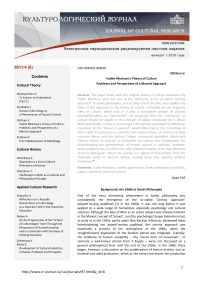Теория культуры Вадима Межуева: проблемы и перспективы марксистского подхода
Автор: Ойттинен Веса
Журнал: Культурологический журнал @cr-journal
Рубрика: Теоретическая культурология
Статья в выпуске: 4 (6), 2011 года.
Бесплатный доступ
Статья посвящена оригинальной теории культуры, которую развивает В. М. Межуев. Он был одним из приверженцев деятельностного подхода в советской философии и в настоящее время принадлежит к числу тех немногих, кто использует идеи этого подхода при построении теории культуры. Критикуя старый, догматический взгляд на культуру, который предполагает в ней только некую сумму умножающихся культурных свершений, он предложил искать сущность культуры в концепции труда, развиваемой К. Марксом. В соответствии с концепцией Межуева, культура является, прежде всего, результатом «всеобщего труда», который К. Маркс в «Очерке критики политической экономии» (1857-1858) охарактеризовал как научный и творческий труд, в отличие от конкретного и абстрактного труда. «Трудовая теория культуры» В. М. Межуева является инновационной и открывает новые перспективы для понимания феномена человеческой культуры. Однако она имеет и некоторые проблемы, из которых самой важной представляется та, что автор слишком решительно отделяет культуру как сферу свободной деятельности от отчужденного мира абстрактного труда.
Вадим михайлович межуев, деятельностный подход в советской философии, к. маркс, теория культуры
Короткий адрес: https://sciup.org/170174254
IDR: 170174254 | УДК: 008:001.8МЕЖ
Текст научной статьи Теория культуры Вадима Межуева: проблемы и перспективы марксистского подхода
Open PDF
Background: the 1960s in Soviet Philosophy
One of the most interesting phenomena in Soviet philosophy was undoubtedly the emergence of the so-called “activity approach” ( dejatel’nostnyj podkhod ) [1] in the 1960s. It was not long before it was applied to a wide range of humanities, especially psychology and cultural sciences. Although the idea of Man as an active subject was already inherent in the Marxist concept of “praxis”, and the psychologist Sergei Rubinstein had, as early as in the 1930s, partly under Neo-Kantian influence, developed ideas foreshadowing the dejatel’nostnyj podkhod , the activity approach was essentially a product of the atmosphere of the 1960s, when the straightforward dogmatism of the Stalinist period was mitigated. Typically, the problems of human sociability – the “social form of movement”, to reiterate a well-known phrase from F. Engels – were not discussed on a general philosophical level until the end of the 1950s. In the 1960s there began, however, a discussion on the problematics of human activity, and on material and ideal production, which at the same time meant the production
Humanities
Lukov Val.
Lukov Vl.
Sigmund Freud: Liveliness of Ideas
Mediated Action: Between Reason and Culture
Interview with James V. Wertsc
Small Encyclopaedia of Culturology
Zaks L.
Cultural and Philosophical Universe of Moisey S. Kagan: Foundations, Territories, Limits (for the 90th anniversary of the famous philosopher) (Part 2)
Reviews
Polyakov Т.
“The Very Timely Book…” Review of the Published Documentary Collection on the History of Russian Museology (Музееведческая мысль в России ХVIII–ХХ вв. : сб. документов и материалов
/ отв. ред. Э. А. Шулепова. М.: Этерна, 2010. 960 с.: ил.)
Current Events
Andreeva E.
Trushkina E.
The Days of Ethnographic Cinema Film Festival
(25 September – 2 October 2010, Moscow)
The Role of Museums in Shaping Historical Consciousness (Outlines of the International Conference)
of Man of himself. Particularly important philosophers were Evald Il’enkov (1924–1974), Genrikh Batishchev (1932–1990) and Yury Davydov. Considering more noteworthy publications belonging to this period one could mention the collective work Problema cheloveka v sovremennoj filosofii (M., 1969).
Genrikh Batishchev seems to have been one of the first philosophers who tried to apply the new approach to the concept of culture. In an early article, published in 1962, he wrote: “The human culture presents itself to the emerging humanity in a reified form – as an overwhelming richness of results of past labour. The living activity of many generations has become congealed and embodied into the properties of the ”things”: technical instruments, tools, works of art, books […] All this must be acquired back, all this must be de-reified – it must be enlivened, the attributes of “things” must be turned into the content of a new activity, of new creative abilities […] Only in the living fire of human labour the cultural values are able to live, to change their form and to enrich themselves” [2] .
For Batishchev, the category of “activity” was central in order to explain the essence of human sociability, indeed the essence of Man himself. It formed the “cell”, of which material and ideal forms of culture were to be deduced, in an analogy of Marx’s concept of commodity in Capital , which forms the starting-point of the exposition of capitalist economy and from which usevalue, exchange value, money, credit, capital, interest, etc. are deduced. Batishchev understood the activity as a dialectical unity of reification ( opredmechivanie ) and de-reification ( raspredmechivanie ) [3] , clearly developing and systematising here Marx’s account of the labour process in the Paris Manuscripts of 1844.
To my mind, these outlines of the shestidesjatniki generation of Soviet philosophers would have offered a good starting-point for a more adequate understanding of a Marxist anthropology than the parallel discussions in the West on “Marxist humanism”, which were also inspired by the Paris Manuscripts of Marx and led to the well-known “anti-humanistic” counterattack by Althusser and his disciples. Had the ideas of Soviet “activity approach” been better known in the West, they might have helped to find a constructive way out of the impasse created by the Althusserians and enabled a scientific-rational (i.e. not only existentialistic) theory of Marxist humanism. However, of course, it is useless to cry over spilt milk.
Список литературы Теория культуры Вадима Межуева: проблемы и перспективы марксистского подхода
- Г. С. Батищев, Методологические аспекты формирования целостной личности, in: Доклады Академии педагогических наук РСФСР, 1962, № 2, pp. 23-24
- В. М. Межуев, Идея культуры, М., 2006, p. 281.
- В. М. Межуев, Идея культуры, p. 282.
- Karl Marx, Das Kapital I, MEW bd. 23, s. 61.
- В. М. Межуев, Идея культуры, p. 304-305.


